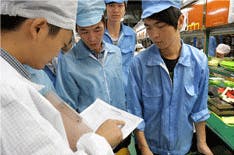Worker advocacy groups are calling on Americans to hold off purchasing new iPhones and iPads, saying that more than 1 million workers at Apple supplier factories in China are at risk for exposure to toxic substances on the assembly line.
According to “Bad Apple: End Smartphone Sweatshops," a major new campaign launched by the nonprofit organization Green America, Apple could curb the toxic threat to 1.5 million people working in supplier factories in China for as little as $1 in additional cost per device.
The campaign also encourages all Apple customers to express their concerns to Apple directly via an online petition. In recent months, Green America scored a major success with a similar social media-based campaign that pressured General Mills into dropping GMOs from original Cheerios.
“Apple is a highly popular brand, one that consumers trust and expect to act responsibly,” said Elizabeth O'Connell, campaigns director at Green America. “Apple is also highly profitable so it can easily afford to do right by its workers and make the necessary changes to appeal to its socially-conscious consumers.”
An estimated 1.5 million people work in Apple’s supplier factories in China. Smartphones, including iPhones, regularly are made in factories where workers do not have adequate training or protective gear for handling toxic substances. According to the EPA’s Air Toxics web site, exposure to dangerous chemicals can lead to cancer, leukemia, nerve damage, liver and kidney failure and reproductive health issues, depending on the chemical and level of exposure.
Green America acknowledges that it is difficult to quantify exactly how many workers have been diagnosed with occupational poisoning in China and it is widely believed that incidents are underreported. One 2010 study in the Journal of Environmental Health and Preventative Medicine showed that between 1991 and 2008, 42,890 work-place poisonings had been documented with a mortality rate of 16.5 percent. It concluded that the situation of occupational health in China still is serious.
Human Cost of Manufacturing Process
China Labor Watch joined the two organizations announcing the campaign, in order to call attention to the plight of Chinese workers in Apple factories.
“Manufacturers adapt to the ever-tightening price and time demands of consumer electronics brand companies by lowering costs through longer hours, faster work, less worker safety training and the use of harmful chemicals,” said Kevin Slaten, program coordinator of China Labor Watch. “Even knowing what it means for the people making its products, Apple continues to maximize profits through such demands. In the end, the price for profit maximization is paid for by Apple's workers.”
Apple is highly profitable, earning $37 billion in profits in 2013. On average, Apple’s profit margins on iPhones are close to 40 percent, higher than any of Apple’s competitors.
“The changes required for Apple to switch to less toxic chemicals in its manufacturing facilities and offer real worker training are estimated to cost Apple roughly $1 per phone, if even that,” said Associate Communications and Journalism Professor Jack Qiu and advisor to the Hong Kong-based Students and Scholars against Corporate Misbehavior (SACOM). “Apple is clearly unwilling to share its success with frontline workers, thus depriving them of a safe and decent place to work. While each iPhone boasts it was ‘designed by Apple in California,’ the true story is that it was made in China by a worker Apple is quick to ignore.”
Apple: We Don’t Cut Corners
A call to Apple was not immediately returned, but a look at Apple's Web site indicates that publicly, the company takes corporate responsibility seriously. In a statement on its web site, the company claims, “We don’t let anyone cut corners on safety. We constantly find ways to make production processes and facilities safer. We also provide leading education opportunities to increase health and safety management in our supply chain.”
Apple said it has been driving improvements through its audit and corrective action process. Experienced EHS managers are critical to taking this next step, but there’s a shortage of people with advanced EHS skills in parts of Apple’s global supply chain.
In many cases, factory supervisors have no alternative but to assign underqualified personnel to EHS leadership roles.
“These people can fix problems after the fact, but they lack the education and knowledge to proactively find and resolve issues before they become problems,” says Apple.
To address this education gap and expand the pool of qualified EHS managers, the company launched the Apple Supplier EHS Academy – a formal, 18-month program that Apple says is one of the most comprehensive EHS training and education programs in any supply chain.
To develop the academy, Apple worked in partnership with Nanjing University, Sun Yat-sen University and the Institute for Sustainable Communities, a nonprofit organization focused on community-based solutions to reduce climate pollution in the United States and China. Leveraging existing curricula, the partners created a unique program that aims to build strong EHS personnel.
Apple shares the cost of the program with our suppliers, who pay half the academy fees for their participants. In 2013, more than 240 factory personnel from over 60 supplier facilities covering 270,000 workers enrolled in the EHS Academy.
The Academy offers 25 courses for environment, health and safety. It includes general and customized classes in subjects such as hazards risk identification and assessment, fire safety, ergonomics, industrial hygiene, water management and air pollution control. The academy focuses on foundation setting, skill building, management, and leadership. Participants must choose and complete 19 courses. At the end of the program, participants receive a certificate of completion from the universities.
“It’s not just factory personnel who are required to get involved in the academy,” says Apple. “Decision makers at the senior leadership level learn about the program at a mandatory one-day seminar that’s co-led by our Supplier Responsibility and Operations teams. Through their attendance at this seminar, factory managers personally commit to supporting their EHS managers throughout the course of the academy.”
About the Author

Sandy Smith
Sandy Smith is the former content director of EHS Today, and is currently the EHSQ content & community lead at Intelex Technologies Inc. She has written about occupational safety and health and environmental issues since 1990.

